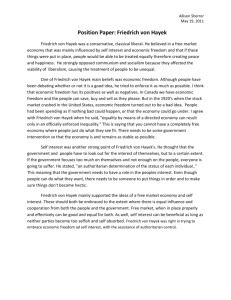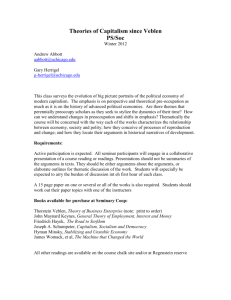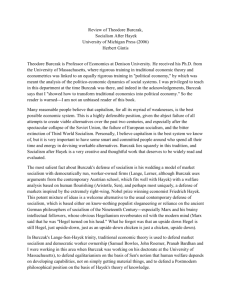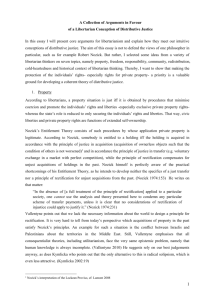Chapter Two (doc 103 KB)
advertisement
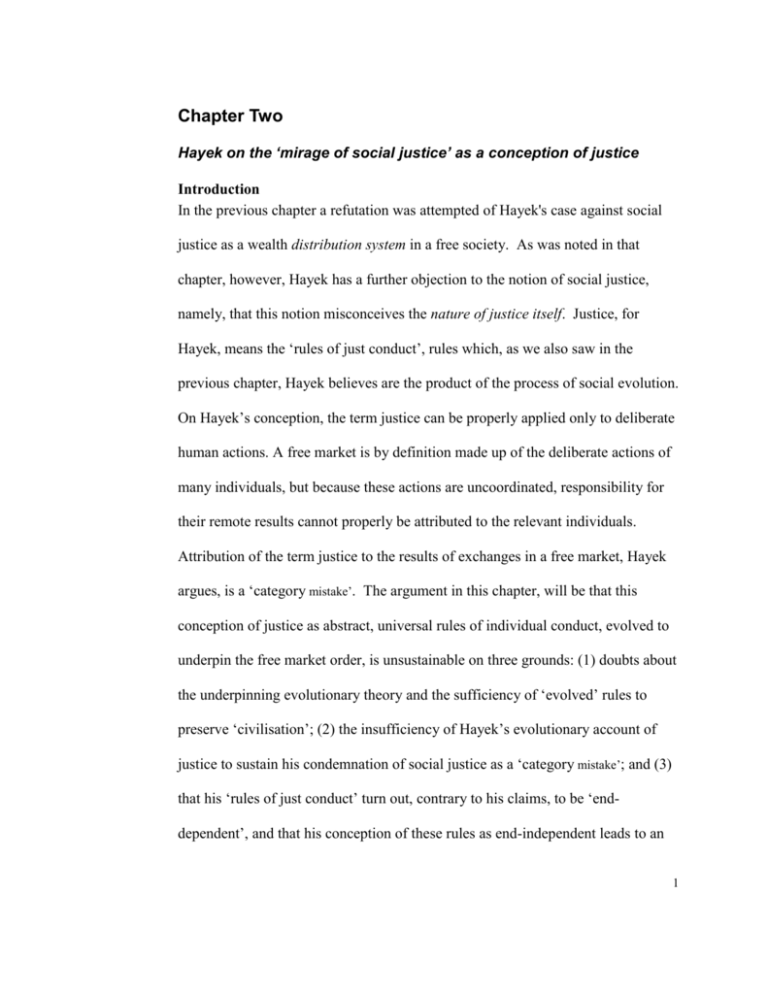
Chapter Two Hayek on the ‘mirage of social justice’ as a conception of justice Introduction In the previous chapter a refutation was attempted of Hayek's case against social justice as a wealth distribution system in a free society. As was noted in that chapter, however, Hayek has a further objection to the notion of social justice, namely, that this notion misconceives the nature of justice itself. Justice, for Hayek, means the ‘rules of just conduct’, rules which, as we also saw in the previous chapter, Hayek believes are the product of the process of social evolution. On Hayek’s conception, the term justice can be properly applied only to deliberate human actions. A free market is by definition made up of the deliberate actions of many individuals, but because these actions are uncoordinated, responsibility for their remote results cannot properly be attributed to the relevant individuals. Attribution of the term justice to the results of exchanges in a free market, Hayek argues, is a ‘category mistake’. The argument in this chapter, will be that this conception of justice as abstract, universal rules of individual conduct, evolved to underpin the free market order, is unsustainable on three grounds: (1) doubts about the underpinning evolutionary theory and the sufficiency of ‘evolved’ rules to preserve ‘civilisation’; (2) the insufficiency of Hayek’s evolutionary account of justice to sustain his condemnation of social justice as a ‘category mistake’; and (3) that his ‘rules of just conduct’ turn out, contrary to his claims, to be ‘enddependent’, and that his conception of these rules as end-independent leads to an 1 incoherent account of ‘practical reasoning’, and a fragmented concept of the self. The next section is devoted to an exposition of Hayek’s conception of justice, and the following one to its refutation. Hayek on moral responsibility in free societies: justice as ‘rules of just conduct’ Hayek's conception of social evolution shapes his critique of social justice as a system of justice just as it shaped his critique of it as a distribution system. The first and major problem with the conception of justice as ‘social’ or ‘economic’, he holds, is the failure of such a conception to take account of the evolutionary character of morality and of the institutions like justice in which morality is expressed: Indeed, the basic point of my argument - that morals, including, especially, our institutions of property, freedom and justice, are not a creation of man's reason but a distinct second endowment conferred on him by cultural evolution - runs counter to the main intellectual outlook of the twentieth century (Hayek, 1988, p. 52). The trust in collective wisdom, which characterised the tribal stage of social evolution, characterised also the conception of justice in this stage. Justice at this stage was based on some notion of a common end: ...we can hardly say when tribes first appeared as preservers of shared traditions, and cultural evolution began. Yet somehow, however slowly, however marked by setbacks, orderly cooperation was extended, and common concrete ends were replaced by general, end-independent abstract rules of conduct (Hayek, 1988, p. 31). According to Hayek, however, the extension of ‘orderly cooperation’ led to the supersession of this conception of justice as human beings evolved from tribal members dependent upon communal wisdom to individuals capable of freely determining their own affairs. As we saw above (p. 41), it is individual freedom which, on Hayek's view, enabled the formation of the spontaneous order he calls 2 society. The conception of justice, argues Hayek, which has emerged from the same evolutionary process is an individual rather than a communal one. Justice, on his conception, consists of individual conduct in accordance with the rules evolved to govern the process of forming and preserving the spontaneous order of society. According to Hayek, it is the socialists’ failure to recognise the evolutionary character of the rules of just conduct that causes them to misconceive the nature of justice: The consequences are particularly dangerous - to reason as well as to morality - when preference not so much for the real products of reason as for this conventional tradition of reason leads intellectuals to ignore the theoretical limits of reason, ... and to misrepresent the origin and functions of our traditional moral rules (Hayek, 1988, p. 54). As we saw in the previous section, Hayek believes that those who consider themselves free to tamper with the very social institution on which the material welfare sought by the socialists depends, the market order, threaten the survival of ‘civilisation’ itself. The second problem with the conception of justice as ‘social’ or ‘economic’ also stems, according to Hayek, from neglect of its evolutionary character. This problem, he argues, is that it conceives an ‘impersonal process’ (Hayek, 1976, p. 63) of distribution under the control of no individual as if it were controlled by some individual who could be held responsible for its results (Hayek, 1976, p. 62). Those who hold this conception, Hayek contends, commit a ‘category’ error: they assign to this ‘impersonal process’ the attribute of ‘justice’ or ‘injustice’ which really belongs only to ‘human actions or the rules governing them’ (Hayek, 1976, p.31). Indeed, the legitimacy of attributing ‘justice’ or ‘injustice’ even to rules is due to 3 linguistic practice rather than to conformity with the true nature of justice. Contrary to the assumption of various conceptions of social justice, justice cannot strictly speaking be an attribute of ‘states of affairs’: Strictly speaking, only human conduct can be called just or unjust. If we apply the terms to a state of affairs, they have meaning only in so far as we hold someone responsible for bringing it about or allowing it to come about. A bare fact, or a state of affairs which nobody can change, may be good or bad, but not just or unjust (Hayek, 1976, p. 31, note omitted). According to Hayek our tendency to extend our attribution of justice to states of affairs is to be explained as a remnant of the tribal phase of social evolution, that is, as the effect of ‘naive thinking’ which makes us cling to ‘primitive concepts’ on which conformity to rules of individual behaviour can be demanded of an ‘impersonal process’: This conception of ‘social’ justice is thus a direct consequence of that anthropomorphism or personification by which naive thinking tries to account for all self-ordering processes. It is a sign of the immaturity of our minds that we have not yet outgrown these primitive concepts and still demand from an impersonal process which brings about a greater satisfaction of human desires than any deliberate human organization could achieve, that it conform to the moral precepts men have evolved for the guidance of their individual actions. (Hayek, 1976, p. 63, note omitted). On the view of justice produced, according to Hayek, by the process of evolution, justice can be properly attributed to ‘...not only the actions of individuals but also the concerted actions of many individuals, or the actions of organizations...’ (Hayek, 1976, p. 32), such as governments, but not to society. Society is not an organization because its order is not one ‘made’ to meet a common end, but a ‘spontaneous order’ and so long as it remains so ‘... the particular results of the social process cannot be just or unjust’ (Hayek, 1976, p. 32). 4 The third problem with the notion of ‘social justice’, Hayek holds, is that it would impose some rational constructivist common end on a spontaneous order produced by the following of evolved rules. ‘Social justice’ would mean distribution of wealth according to a common ideal such as ‘desert’ or ‘need’, but the application to the market of a distribution based on such an ideal would violate what Hayek termed the spontaneous order of the market. We recall that a spontaneous order is by definition one brought about not by some guiding hand to serve a common end, but, in the case of the market order, by individuals pursuing a multiplicity of ends. A distribution of wealth according to some ideal of social justice would, on Hayek's view, be the application by an ‘organization’ of ‘end-dependent’ rules to a socially evolved process which can only thrive on ‘end-independent’ rules. Invoking the royal plural, Hayek comments: ‘We have chosen the term “rules of just conduct” to describe those end-independent rules which serve the formation of a spontaneous order, in contrast to the end-dependent rules of organization’ (Hayek, 1976, p. 31). The latter kind of rules tends to form a totalitarian society because, according to Hayek, one of the conditions for achieving their ends is that somebody in the ‘organization’ has the power to command obedience to them. The former kind, however, supports the evolution of an ‘Open Society’ because, being independent of any ends, these rules leave individuals free to pursue their various ends. Before I can appraise these aspects of Hayek's critique of social justice, I need to amplify his account of the ‘rules of just conduct’, particularly in relation to their 5 extension, function in society, content and source of authority. Such rules, he holds, can relate only to ‘... such actions of individuals as affect others’ (Hayek, 1976, p. 33). But not all human actions affecting the position of others can be assessed as ‘just’ or ‘unjust’. He observes that in a spontaneous order there will be many human actions which will affect the position of others in the order, but, he writes, ‘Only those aspects of the order of human actions which can be determined by rules of just conduct do therefore raise problems of justice’ (Hayek, 1976, p. 33). Since these rules govern only the actions of individuals pursuing their own ends, the unintended, general results of all those actions cannot be regarded as just or unjust. Even the situation created by the just actions of individuals in a spontaneous order cannot be described as just because to do so is to ignore the fact that such an order is the product of many individual decisions made to serve the ends of the relevant individuals, not some common end. The function of Hayek's rules of just individual conduct is supposed to be not the protection of individual freedom from all interference (anarchy), but the protection of the freedom of all by the amount of interference necessary for that protection. He believes there is a legitimate role of enforcement for the state in relation to such conduct. An order appropriate to a free society can only be secured, on his view, if the individual members of society can rely in the pursuit of their various ends on the enforcement of rules applying equally to all. Their function of protecting the freedom of all means that the content of these rules is negative. 6 According to Hayek the content of these rules is negative ‘... in the sense that they prohibit rather than enjoin particular kinds of actions, that they do so in order to protect ascertainable domains within which each individual is free to act as he chooses, and that the possession of this character by a particular rule can be ascertained by applying to it a test of generalization or universalization’ (Hayek, 1976, 36, omitting notes 6, 7 and 8) . Hayek's explication in this passage of the ascription ‘negative’ to the rules of just conduct is not altogether clear. The purpose of the negative character of these rules, according to Hayek, is ‘to protect ascertainable domains within which each individual is free to act as he chooses’, but why must the rules be negative in order to serve this purpose? His answer seems to be that the rules of just conduct are negative because positive rules are more likely to imply dependence upon some end or good, an implication consistent with socialist theory and contrary to his end-independent theory of law. The socialist conception of justice sought to prescribe positive rules governing the distribution of goods to each member of the community according to the relevant community’s notion of its common end or good. Hayek, however, denies the existence of any common end or good according to which distributions of particular goods could be determined and holds instead that the distribution system evolved by the free society and on which its survival depended was the market system. Since the market consisted of the free transactions between its individual participants, justice, on this conception of the results of social evolution, had to consist of rules protecting individual freedom to engage in such transactions. 7 Thus, the rules of just action are negative in the sense that they prohibit actions interfering with such freedom. The third clause in Hayek's explication of the ascription ‘negative’ to the rules of just conduct states ‘that the possession of this character by a particular rule can be ascertained by applying to it a test of generalization or universalization’. It is not entirely clear what the referent of the phrase ‘of this character’ is. The referent could be ‘negative’ since the entire sentence is an attempt to explicate the sense in which the rules of just conduct are negative. Grammatically, however, it would seem more correct to take the referent to be the content of the immediately preceding clause, namely, ‘to protect ascertainable domains within which each individual is free to act as he chooses’. On this interpretation, the meaning of Hayek’s third clause in this passage would be that we can test whether a particular rule protects such domains of freedom by asking whether the rule applies equally to all like cases: whether it is ‘universalizable’. If a particular rule fails this test, we may take Hayek to be saying, it cannot be just because it does not uphold that equal freedom of all upon which the market and indeed civilisation depends. For on his conception of justice, Hayek writes: The chief function of the rules of just conduct is ... to tell each what he can count upon, what material objects or services he can use for his purposes, and what is the range of actions open to him. They cannot, if they are to secure to all the same freedom of decision, give similar assurance of what others will do, unless these others have voluntarily and for their purposes consented to act in a particular manner (Hayek, 1976, p. 37). 8 Rules which compel some to act in particular ways, Hayek believes, secure freedom of decision in the pursuit of their ends only to those not so compelled, and having thus failed the test of ‘universalization’, cannot be regarded as just. More particularly, the content of that domain to be protected by the rules of just conduct will, on Hayek’s conception of justice, include ... what David Hume called ‘the three fundamental laws of nature. that of stability of possession, of its transference by consent, and of the performance of promises', or, as a modern author sums up the essential content of all contemporary systems of private law, ‘freedom of contract, the inviolability of property, and the duty to compensate another for damage due to his fault’ (Hayek, 1976, p. 40, quoting Hume and Leon Duguit, notes 22, 23). It is noteworthy that the emphasis in this view of freedom is on economic freedom and that he makes no mention of political freedom. The source of the authority of rules of just conduct is not, according to Hayek, the will of the lawmaker, as legal positivist tradition, upon which rational constructions like socialism depend, would have us believe but consistency with those rules which have emerged from the process of social evolution. The rules of just conduct are the rules which have been devised and tested in circumstances and for purposes long forgotten in the process of social evolution, but which, insofar as they continue to be found just by the present generation, are viewed as authoritative. These rules are not unchangeable, but the test of the validity of any change is, according to Hayek, the enhancement of the consistency of the system to be produced by such change: 'Rules of just conduct are thus determined not by ‘will’ or ‘interest’, or any similar aim at particular results, but develop through a 9 persistent effort (Ulpian’s ‘constans et perpetua voluntas’) to bring consistency into a system of rules inherited by each generation’ (Hayek, 1976, p. 40). Having rejected the ‘constructivist’ notion that the authority of law stems from some human will, Hayek is quick to reject also the notion that this authority might be founded in some divine will: The evolutionary approach to law (and all other social institutions) which is here defended has thus as little to do with the rationalist theories of natural law as with legal positivism. It rejects both the interpretation of law as the construct of a super-natural force and its interpretation as the deliberate construct of any human mind (Hayek, 1976, p. 60). For Hayek moral responsibility and legal obligation are owed to a set of rules evolved by the human race for the purpose of creating order in a society, which is both free and pluralist. Although he doubts that ‘... there are any actions which can be called merely ‘economic’...’ (Hayek, 1960, p. 35), he sees free markets as expressions of the ‘spontaneous order’ produced by those evolutionary forces. This view of justice is held by Hayek to be incompatible with any notion of social justice because, on his assumption, any such notion implies the imposition of particular distributions of goods on society by a supreme lawgiver. We turn now to an appraisal of this evolutionary conception of justice and its implications for the notion of social justice. Criticism of Hayek's attempt to limit justice to the ‘rules of just conduct’ 1. Hayek's ‘evolutionism’ 10 The major problem with Hayek's conception of justice as the rules of just conduct is that his account of the evolutionary derivation of those rules, even if the doubts about its content could be satisfied, cannot do the job he tries to make it do: substitute for a normative account of justice. We recall (see pp.38ff.) that Hayek sees both our ‘moral traditions’ and the power of reason itself as the fruit of social evolution. Justice, which he defined as the ‘rules of just conduct’, formed part of that traditional inheritance. Referring to the ‘rules of just conduct’ as a spontaneous order, Hayek (1967, p. 163) wrote: This order which has progressively grown beyond the organizations of the family, the horde, the clan and the tribe, the principalities and even the empire or national state, and has produced at least the beginning of a world society, is based on the adoption - without or often against the desire of political authority - of rules which came to prevail because the groups who observed them were more successful; and it has existed and grown in extent long before men were aware of its existence or understood its operation (quoted by Gissurarson, 1987, p. 65). Hayek’s contention is that the spontaneous order of the free society has emerged triumphant from the competition with its primitive rivals not because citizens over time have selected its underpinning rules as the most efficient for guiding their lives but because a blind ‘group selection’ process has taken place. But he does not base this claim on any direct evidence of what took place in the selection process; rather he grounds his claim on the supposed results of the process: ‘... groups who observed [the relevant rules] were more successful’. The role he attributes to reason in this selection process is also a matter of supposition to fit his evolutionary hypothesis. That role is limited to an adaptive rather than a creative or reconstructive one: the rules existed and were growing ‘... long before men were aware of its existence or understood its operation’. Hayek even admits that these 11 rules and the powers of reason may be imperfect, but his plea is that they are all that the process of evolution has left us with to address questions of justice. Notwithstanding the necessary tenuousness of the ‘conjectural history’ on which he bases his claims about his selection process, Hayek admits no qualification to his claim of the superiority of his evolutionary theory of justice to its socialist rival. Attempts, such as socialist constructions of social justice, at reconstruction of the rules which underpin the distribution system left us by the process of cultural evolution are manifestations of a ‘fatal conceit’: a pretence that we can exceed the powers of reason left us by evolution to create anew the rules of justice left us by the same process. There are several difficulties with Hayek's case for an evolutionary rather than a rational constructivist view of the nature and sources of moral rules. First, Hayek's strictures on ‘reconstructing’ such institutions as the rules of just conduct depend on the validity of his claim that these rules are the fruit of the abovementioned selection process. Since, on his own admission, the existence and operation of this process has been inferred, not from any direct knowledge of its details and mechanisms but from the survival of groups in which these rules prevailed, the validity of this inference depends upon the security of the causal link between prevalence of these rules and survival of the relevant groups. But this link is vulnerable. As Ulrich Witt points out, survival, on the available evidence, seems to be related to other factors besides observance of these rules, factors such as ‘... adequate medical care and a minimum intake of calories’ (Witt, 1994, p. 184). 12 Moreover, Witt observes, populations are increasing most rapidly in countries where the market economy is least developed and where the underpinning rules of just conduct are least likely to be prevailing. If group survival is to be measured in terms of number of descendants, the most successful groups would appear to be not, as Hayek hypothesised, those which adopted the rules of just conduct, but those which did not. Although such evidence does not decisively refute Hayek's group selection hypothesis, it does count against it, and gives us reason for scrutinising more closely his claims about the survival value of the rules supposedly underpinning the spontaneous order of the market. The second difficulty with Hayek's case for an evolutionary rather than a rational constructivist view of morality concerns his claims about the survival value of the rules underlying spontaneous orders like the market. In a recent article Gus di Zerega argued that spontaneous orders were biased towards particular sets of values, and that such biases could lead them into conflict with other orders, conflict which might only be resolvable by interfering with the relevant spontaneous order. The modern market order, for example, may have grown so large that it has minimised, if not lost, the feedback systems it once possessed about local social and environmental effects of its practices. Its bias towards satisfying consumer demand thus drives it to the service of those demands despite, for example, the potentially disastrous environmental effects of doing so. Market practices cannot be based, because of this bias, on long-term environmental considerations, and the very remoteness and impersonality of modern market 13 relations have robbed this order of the feedback systems that might have produced adaptations to its practices when market relations were more local and more intimate. The qualities of spontaneity and adaptiveness of orders like the market and its underpinning rules of just conduct may have survival value within such orders, but whether the orders themselves can survive depends, according to di Zerega, upon other factors in the relevant context: Liberal society may remain marvellously adaptive by its own standards while becoming increasingly parasitic in its relationship to the natural world. Adaptation always occurs within a context, but the circumstances that determine whether survival is possible are not always respectful of that context (di Zerega, 1997, p. 140). Because the liberal community does not ‘... weight individual choices towards the respect and maintenance of natural processes’, di Zerega argues that survival may depend upon interference with the spontaneous order of the market. If the liberal community is unable to generate ‘the moral constraints and values’ necessary for the long term survival of both people and nature, then he believes that Countervailing power needs to be provided. Given the institutional amorality of corporations, bureaucracies, and, indeed, of all large organizations, this power needs to be quite strong. Its ethical basis ... must transcend the span of a human life (di Zerega, 1997, p. 140). Of course, Hayek's reason for condemning attempts at reconstructing institutions he regarded as spontaneous products of evolution such as the market order and its underpinning rules of just conduct was not the belief that such institutions were perfect and could never be reformed. Hayek held that spontaneous orders possessed the feedback systems necessary to reform the orders from within. The problem with this response to di Zerega’s difficulty is, however, that it ignores the 14 basis of that difficulty: di Zerega’s claim that these feedback systems sometimes break down, and survival thus requires interference with the relevant orders. The third difficulty with Hayek's case for an evolutionary rather than a constructivist view of morality is that the rules evolved in, and underpinning, the spontaneous orders within society may not be sufficient to ensure society’s survival. Hayek acknowledges that there is a problem in knowing which rules have survival value. He readily admits that not all rules obeyed in a society will produce an order; every society has numerous rules that are pointless and even bizarre. However, he holds that the emergence and maintenance of order in a free society is dependent upon the observance of certain rules. The problem for his theory is that we can only know which rules produce such order after they have already done so. Hayek's criterion for distinguishing rules which are conducive to the production of order from those which are not is the survival of the societies in which particular sets of rules have been observed. ‘But’, comments Norman Barry, such a negative approach [to evaluating rules] runs into difficulties when the issue of the creation and enforcement of those rules which do not normally emerge spontaneously, and yet which are essential for survival of a society, arises. I am thinking here of the rules of even a limited government, and those rules which it is in the interests of us all to obey but which from a private point of view we have an interest in not obeying (Barry, 1979, p. 82). Hayek, of course, proposed certain political structures for a free society but did not pretend that such structures could arise spontaneously. He also acknowledged that some taxation laws were necessary for the survival of society (1976, p. 87), but he 15 gave no indication of which laws would be conducive to this purpose, and clearly we could all have a private interest in some circumstances in avoiding lawful taxes. Since no free society can function without the observance of such rules and the evolutionary process has not generated them, it follows that the survival of such society not only permits but even requires the adoption of some rules which Hayek would regard as ‘rational constructivist’. Indeed, the fourth difficulty with Hayek's case for an evolutionary rather than a constructivist view of morality is whether his claim that history bears witness to the superior survival value of spontaneous orders and their underlying rules is sustainable. In assessing this claim, we must be careful not to exaggerate it. We have already noted in the previous paragraph that Hayek claimed to be able to assess the survival value of any particular rule or set of rules only with hindsight. We should also note in this connection his vehement denial of the charge by Bertrand Russell and A.G.N. Flew that by his ‘evolutionary ethics’, Hayek is committing the ‘naturalistic fallacy’: I do not claim that the results of group selection are necessarily ‘good’ - any more than I claim that other things that have long survived in the course of evolution, such as cockroaches, have moral value. I do claim that whether we like it or not, without the particular traditions I have mentioned, the extended order of civilisation could not continue to exist... (Hayek, 1988, p. 27). But even with these qualifications the last claim would surely entitle us to expect evidence of some kind of orderly progression in history. It is open to doubt whether history does reveal such evidence. John Gray, for example, is somewhat scornful of views which see orderly progress in history: 16 Only an historical theodicy could give man’s random walk in historical space the aspect of an orderly progression, when what is disclosed to the critical eye are rare episodes of freedom surrounded by long stretches of barbarism and tyranny (Gray, 1993, p. 52)i. Furthermore, Gray argues, this view of history is not supported by contemporary developments in the former Iron Curtain countries where ‘... the inherited (or imposed) institutions of central planning are collapsing without the evolutionary emergence of successor institutions’ (Gray, 1993, p. 52). Even in Poland where some of the institutions repressed by the former regime have spontaneously reasserted themselves, Gray writes, ‘... the legal, political and economic framework of civil society cannot there emerge as a property of institutional evolution; it must be constructed, or else re-constructed in the wake of revolution’ (Gray, 1993, p. 52). If, in other words, spontaneous or ‘undesigned orders’ are as likely to produce tyranny as freedom, even the claim that spontaneity is a necessary but not a sufficient condition of the survival of institutions constituting the framework of civil society is open to legitimate doubt. The fifth difficulty with Hayek's defence of an evolutionary rather than a rational constructivist view of morality concerns the serious tension between the ‘functionalism’ of Hayek's group selection hypothesis and the ‘methodological individualism’ that he adopted against the ‘historicists’ (see introduction to Chapter One). As Witt observes: From an individualistic point of view little is explained by referring to the conjecture that differential growth among groups determines what rules of conduct are best suited for developing an extended order. What would have to be explained is how the individuals whose behaviour is concerned are induced to adopt and adhere to those rules especially where individual self-interest may be opposed to their adoption and adherence (Witt, 1994, p. 185). 17 If obedience to rules maximising freedom to pursue individual interests functions to optimise group interest in survival, Hayek has to explain how the obvious potential clashes between individual and group interests fail to undermine this function. I may add that there are also difficulties with Hayek's theory from a functionalist point of view. The theory conjectures that history will reveal that groups following the rules of just conduct underlying the spontaneous order of the market will have better survival rates than other groups. As we noted in the previous paragraph, the historical evidence on this conjecture is ambiguous and even open to doubt. Thus, although the conjecture may be a warrant for caution in choosing rules, it is logically too weak to justify such strong inferences as his claim that adoption of ‘rational constructivist’ rules derived from notions such as social justice will jeopardise the survival chances of ‘civilisation’. Furthermore, having so vehemently denied that the basis of his functionalist perspective involves the ‘naturalistic fallacy’ – that, as the products of evolution, his rules of just conduct were necessarily morally good - Hayek logically concedes the need for a non-evolutionary i.e. normative justification for attributing moral goodness to these rules. Paradoxically, however, later in the same work he denies the possibility of such a justification for any moral tradition, characterising the demand for one as reflecting ‘primitive’ and ‘rationalist standards’, ‘... the discredited rules of an ancient methodology ...’ (Hayek, 1988, pp. 67-8). Hayek characterises these discredited rationalist standards as ‘... that whatever is not scientifically proven, or is not fully understood, or lacks a fully specified purpose, 18 or has some unknown effects, is unreasonable...’ (Hayek, 1988, p.66). Necessary revisions to our moral rules must be guided not by such conceited rationalist standards but by a kind of reconstruction of their derivation which will to some extent disclose their evolutionary function: ‘While our moral traditions cannot be constructed, justified or demonstrated in the way demanded, their processes of formation can be partially reconstructed, and in doing so we can to some degree understand the needs they serve’ (Hayek, 1988, p. 69). In short, having denied asserting that moral rules, being evolved rules, are necessarily good, Hayek then denies the possibility of any other ground for following the rules except a conjectural reconstruction of their evolutionary function. But this is tantamount to saying that fulfilment of their evolutionary function- of ‘the needs that they serve’ - is what makes it good to obey these rules. By this assertion, Hayek is, in other words, committing the ‘naturalistic fallacy’. Hayek's ambivalence about the foundations of his rules of just conduct does not end here, however. The sixth difficulty with Hayek’s case for an evolutionary rather than a rational constructivist view of morality concerns his smuggling into that case of a normative foundation. Despite his denial of the possibility of a normative justification of any moral tradition, Hayek confers normative status on the survival of the human race and on the order needed, on his view, to ensure that survival. Referring to the morality necessary, on his theory, to support that order and thus the survival of the human race, Hayek writes: 19 And although this morality is not ‘justified’ by the fact that it enables us to do these things [increase in numbers and wealth relative to other groups], and thereby to survive, it does enable us to survive, and there is something perhaps to be said for that (Hayek, 1988, p. 70, emphasis Hayek's). Hayek is trying to ‘have it both ways’ here: both to deny the possibility of a normative justification of his moral tradition, and to assert the normative value of survival. But he encounters damaging consequences for his entire thesis on the nature and role of morality in human life from any of the three propositions derivable from this claim. Firstly, the two parts of the claim in its entirety are inconsistent with each other: Hayek cannot consistently deny the possibility, on the one hand, of a normative justification of morality and affirm, on the other, the normative status of a particular value. Secondly, if he retains the first part of the claim - that a normative justification of morality is impossible - he commits, as I showed in the previous paragraph, the ‘naturalistic fallacy’. Thirdly, if he retains instead the second part of his claim - that survival of the human race is a normative value - he commits himself to one of the rational standards which, as we also saw in the previous paragraph, he condemns as ‘discredited’. And if he persists in this last view, he enters the rational constructivist debate about which rational standards and which moral norms are to be preferred. Hayek might argue in reply to this criticism that he has a standard for determining the validity of particular moral rules, a standard which, because it is independent of any substantive moral value, cannot be regarded as a ‘justification’ in the constructivist sense. That standard would be the standard of ‘universalizability’: 20 ‘... whether we can ‘want’ or ‘will’ that [the rule in question] be generally applied’ (Hayek, 1976, p.28). Application of this standard, according to Hayek, would determine the validity of the relevant rule by determining the degree of its ‘compatibility’ with our existing ‘system of rules’ (Hayek, 1976, p.28). Since the standard of ‘universalizability’ is a purely formal i.e. non-substantive one, it cannot be regarded as a ‘constructivist’ normative standard. The latter strength would, however, also be this argument’s weakness: a non-substantive standard cannot guide us in determining which of two universalizable, but conflicting susbstantive rules is to be chosen. Take for example a conflict within society over what rule is to be adopted for governing the distribution of wealth. A communitarian will be able to ‘want’ in the required sense the adoption of a rule which requires that the needs of all be met before any surplus is distributed. A Hayekian liberal, however, would ‘want’ the adoption of a rule like ‘let the market determine the distribution of wealth’. If Hayek were to retort that only the latter rule was compatible with our existing system of rules, the communitarian could counter in at least two ways. First, s/he could argue that the communitarian rule is consistent with the ‘instinctual’ morality which, on Hayek's own admission, persists in free societies. Second, if this argument were rejected, the communitarian could argue that Hayek's standard of ‘universalizability’ is only apparently a formal one because it functions in Hayek's theory as nothing more than a rational device for ensuring conformity with an existing system of rules based on a particular substantive standard. The standard of ‘universalizability’ will not suffice to validate moral rules. Appeal to this standard will thus not 21 enable Hayek to avoid commitment to normative values. Ultimately, Hayek's account of the nature and role of morality in human life fails because either he commits the naturalistic fallacy or he falls into the constructivist ‘error’ of adopting a normative justification like survival of the human race as the basis for his rules of just conduct. I may conclude this section by saying that Hayek's case against social justice, on the ground that notions of social justice ignore the evolutionary character of justice, fails. Not only does his own hypothesis of the evolution of moral traditions face significant difficulty, but he is exposed as committing either the ‘naturalistic fallacy’ or the rational constructivist ‘error’ of attempting a normative justification of morality. I must now consider Hayek's second objection to the notion of social justice. 2. Social justice a ‘category mistake’? Hayek’s second criticism of the notion of social justice was that it committed a ‘category mistake’ by attributing to an impersonal process of distribution control by some person or persons. At least four points need to be made in response to this criticism. First, as I have already argued in the previous section, Hayek is mistaken in attributing to all theories of social justice the requirement that a particular distribution of goods be imposed on society. Theories which call for a redistribution of goods through the taxation system do not require such a direct intervention in the processes of the market. Defenders of such theories of social 22 justice therefore cannot legitimately be accused of conceiving an ‘impersonal process’ as being under some kind of personal control. Second, in acknowledging the possibility of a ‘moral duty’ on ‘all ... within the organization’ to meet the needs of the ‘severely deprived’, is Hayek not also recognising the possibility of properly ascribing the attribute of ‘injustice’ to a ‘state of affairs’? It is precisely the plight of such people that moves advocates of social justice generally to regard that plight as unjust and as therefore imposing a moral obligation on all in society to relieve it. How, if at all, does Hayek's position in regard to such states of affairs differ from that of advocates of social justice? His conception of justice as the rules of just conduct would require him to reply that for him the source of the possible ‘moral duty’ in such cases cannot be the alleged ‘injustice’ of the particular state of affairs i.e. ‘severe deprivation’. What alternative source might there be of such a duty? As we saw above (p. Error! Bookmark not defined.), Hayek speaks of the basis for this duty as a ‘feeling’: ‘... it may be felt to be a clear moral duty of all to assist, within the organized community, those who cannot help themselves’ (Hayek, 1976, p. 87, emphasis added). It could thus be argued that locating the source of a moral duty in a ‘feeling’ is consistent with what Shearmur sees as Hayek's more general ‘...tendency towards ethical non-cognitivism’ (Shearmur, 1994, p. 196). This argument would not be conclusive but just in case Hayek does ground in a feeling the moral 23 duty, that he admits is possible, to relieve ‘severe deprivation’, it will be useful to consider the consequences of such a view. A non-cognitivist foundation for such a ‘moral duty’ to relieve the plight of the deprived cannot ensure that all recognise that duty. A feeling, after all, is something one either possesses or does not possess; though they may be influenced by logical arguments, feelings, not being the proper objects of such arguments, cannot be compelled by them. And, if I lack the required feeling, I simply will not have the moral duty to relieve the plight of the deprived. A non-cognitivist account of morality will acquit Hayek of attributing injustice to a state of affairs and making that state of affairs the source of a moral duty. Such an acquittal would, however, be purchased at the price of forfeiting all rational grounds for recognising the duty to relieve the sufferings of the severely deprived or any other moral duty. Furthermore, there are other cases where it seems appropriate, contrary to Hayek's contention, to attribute injustice to ‘states of affairs’. There are, for example, numerous cases where application of particular sets of rules gives rise to harmful effects which seem best characterised as ‘unjust’. In advancing this argument, Steven Lukes refers to the examples of ‘private enclosures of the English “commons”’ and the issue of fishing licences outside territorial waters where in both cases all parties were worse off than they might have been under an alternative set of laws (Lukes, 1997, p. 73). Since in such cases all the relevant individuals are in some way victims of the operation of the rules, it is the rules themselves, not the actions of 24 particular individuals, as Hayek's conception of justice would require, which are unjust. Third, Hayek's rejection of the possibility that justice could be social, on the ground of his claim of the superior capacity of the ‘impersonal process’ of the market to satisfy ‘human desires’, is based on a clear exaggeration of that capacity. In the continuation of the passage just referred to, he asserts that the market process ‘...brings about a greater satisfaction of human desires than any deliberate human organization could achieve...’. His use of the term ‘could’ in this passage renders the claim unlimited in its scope, a logical feature which cannot be justified. Since there is no contradiction involved in the notion of a better system of distribution than the market system, this claim is an empirical claim about the past, present and future not a logical claim. Logically, therefore, it follows that no matter how many systems prove to be inferior to the market system, one can never exclude the possibility of a better system being devised at some time in the future. Fourth, Hayek’s condemnation of the notion of social justice as a category error begs the question of how justice is to be defined. A category error is the error of attributing to one object a characteristic (or characteristics) belonging properly only to another. A charge of category error is justified only in cases where the characteristics of the relevant objects are not in dispute. Otherwise the respondents to the charge are entitled to reply that the charge is based on an assumption about the truth of the matter in dispute, that is, that the charge begs the 25 question. The question in dispute between the protagonists of social justice on the one hand and Hayek on the other is whether the correct definition of justice is one which allows its attribution to states of affairs as well as to human conduct or one which allows its attribution only to human conduct. Hayek accuses the proponents of social justice of a category error because they favour a definition allowing attribution of justice to states of affairs as well as to human conduct. His accusation thus assumes the truth about the question in dispute, and is therefore not justified. Until and unless Hayek succeeds in substantiating his preferred definition of justice - the definition, it should be noted, that best supports the free market economic system he advocates - his accusations of ‘category error’ are little more than abusive utterances against the proponents of social justice. 3. Justice as ‘end-independent’ rules Hayek's rejection of social justice, on the ground that it makes justice dependent on some common end, is criticisable from two points of view. The first, advanced by Johnston, argues that ‘the goal of social equality’ is just as ‘open’ to application to the various purposes of individuals as Hayek's end of ‘maximizing aggregate wealth’ (Johnston, 1997a, p. 88ff.). Neither of these goals, Johnston argues, deprives individuals of the freedom to use their wealth for whatever ‘ultimate ends’ they choose. Equality and freedom to maximise wealth, he implies, are not themselves ultimate ends but means of achieving whatever ultimate ends citizens may choose. Moreover, according to Johnston, achievement of the goal of social equality does not necessarily require, 26 as Hayek insists, imposition on the part of an ‘organization’. Implicitly mounting a further challenge to the adequacy of Hayek's definition of social justice, Johnston insists that the definition should include power as well as wealth: So if we define the condition of social justice broadly as a state of affairs in which both wealth and power are distributed in a roughly equal way, the suggestion that social justice could be realized by means of an organization in Hayek’s sense seems self-refuting (Johnston, 1997a, p. 90). If the definition of social justice is understood to include a rough equality of power, any condition achieved by an abuse of power such as the one that would be involved in achieving an equal distribution of wealth by authoritative command would not be the condition of social justice. Indeed, Johnston neatly turns Hayek's own defence of the spontaneous nature of the market order back upon himself when he writes: Hayek's greatest contribution to twentieth century social theory was his emphatic and consistent insistence, following Smith, that organization is not the only means, and often not the best means, of achieving social goals such as the generation of great wealth. Perhaps his greatest shortcoming was his failure to see that this observation could be applied to the goal of social equality as well (Johnston, 1997a, p. 91). On Johnston’s argument, then, not only does social justice not imply commitment to a common ultimate end, it actually precludes the imposition of any such end. Social democrats, in other words, are as opposed as liberals like Hayek to the authoritarian imposition of any kinds of ends. The rough equality of wealth and power which constitute social justice for social democrats can and should be achieved by democratic rather than authoritarian means. Hayek's conception of social justice as an equal distribution of wealth imposed on society by an authoritarian government is, on Johnston's argument, excessively narrow. Johnston’s conception of social justice includes neither a common ultimate end, 27 nor its authoritarian imposition. The second point of view takes a different attitude to the notion of a common ultimate end. The second criticism of this aspect of Hayek's thought is that the attempt to define justice as rules of conduct independent of ultimate ends detaches human conduct from the source of its rational coherence and indeed fragments the human self. On his own admission Hayek's ‘end-independent’ rules are abstracted from the concrete social situations of human conduct. But all rules of conduct develop and are passed on in concrete communities guided by particular practical and moral traditions whose coherence is based on their ends. Rules of human conduct are approved or disapproved, accepted or rejected, insofar as they cohere in some way with the end-dependent traditions or practices of the relevant communities. An abstract set of rules such as Hayek's rules of just conduct would thus, on this argument, either be coherent with some unrecognised or unacknowledged end-dependent tradition or practice or be incoherent. This is, in fact, a criticism leveled at procedural liberalism generally. As we shall see in Chapter Five of this thesis, MacIntyre (1988) argues that the rules or procedures which are claimed to be ‘end-independent’ turn out, in fact, to be rules upholding a particular ideology, namely, liberalism. MacIntyre’s argument on this point is a strong one. Indisputably, Hayek's ‘rules’ are designed to preserve that very distinctive kind of society with its peculiar economic and ethical beliefs and practices so clearly articulated by Hayek himself. If the preservation of 28 the highest form of civilisation evolved by humankind, as Hayek regards the free society, is not an ultimate end, it is hard to know what Hayek would count as such an end. Of course, Hayek might defend his denial of this ultimate end on the ground that, as we just saw Johnston argue, freedom is but the means necessary for individuals to choose their own ultimate ends. But such a defence would involve him in a further problem. T he lack of an ultimate end (even if only a provisional one) would render the totality of an individual’s ends incoherent, and each end vulnerable to displacement by another at any moment. It is hard to see how an individual could maintain coherence between reason and action in the face of such vulnerability. Hayek might respond that coherence can be secured among these ends provided the individual chooses ends that are consistent with one another and hierarchically arranged, but this response would raise a further question about the authority of that coherence. According to Hayek, ends are not given to individuals but are rather chosen by them. That is to say, ends do not derive their authority from an ontological base such as a human teleological structure of the kind proposed by Aristotle, for example. Rather this response would commit Hayek to the view that the authority of the coherence provided by those ends is arbitrary individual choice. Moreover, the basis for the individual’s choices of ends and decisions about action is not, on this defence, an ontological one such as a judgement of reason about the ends to which he or she is teleologically directed but rather a psychological one : some desire or desires. The human self is thus reduced by this response from a consciousness directed by reason to a quest for its ultimate end to a fragmented set of desires. And desires, being vulnerable to overthrow by other desires, provide an unstable basis for human action. Clearly, the account of morality and the human self to which this response would commit Hayek is itself fraught with problems. More importantly, this account does not succeed as a defence of Hayek’s denial of the 29 existence of ultimate ends. Rather this response amounts to a proposal of a particular ideological account of morality and human self, not the ideologically neutral defence of individual freedom to choose one’s own ends that it purports to be. Hayek's definition of justice as ‘end-independent’ rules of just conduct seeks to separate the definition of that concept from ultimate ends such as those that had been imposed on communities in the past by authorities such as the Christian church. In order to separate his rules of just conduct from ultimate ends, however, Hayek has to detach such conduct from the very end-dependent traditions and practices which are the sources of their meaning and coherence. Hayek might reply that he does indeed recognise and respect the moral practices and traditions which people like MacIntyre see as the source of rational coherence and self-identity. However, he might argue that he understands these practices and traditions in an evolutionary rather than a rational constructivist perspective like MacIntyre’s. Coherence of thought and behaviour - and, indeed, survival and prosperity of the human race – come, Hayek might argue, from recognition that, because only a fragmented, conjectural account of these practices and traditions is possible, their rules must often be obeyed without understanding the reasons why. MacIntyre’s, and other rational constructivist views of morality, neglect the evolutionary basis and function of these practices and traditions in a vain and conceited effort to construct normative justifications for the rules derived from them. 30 The general reply to this argument has already been deployed above under the heading ‘Hayek's Evolutionism’. There I argued that Hayek's commitment to this evolutionary perspective on the sources of morality led him to commit the ‘naturalistic fallacy’. I also contended that, despite his denial of the possibility of a normative justification for morality, he smuggled such a justification into his case for his evolutionary account of the basis of morality. That justification was the generation of the knowledge and wealth that underpinned the survival of our civilisation. A more detailed treatment of MacIntyre’s argument will be offered in Chapters Five and Six below. Conclusion In this chapter and in the previous one I have argued that Hayek's case against the notion of social justice fails on several grounds. First, his narrow conception of social justice as the imposition on a market-based society of a particular distribution of wealth by an authoritarian - socialist - government ignores social democratic conceptions on which wealth is redistributed according to democratically determined criteria after market processes have been completed. Second, Hayek's restriction of the conception of justice to the ‘rules of just conduct’ encounters overwhelming difficulties. Apart from the grounds for doubting his evolutionary explanation of their nature and origin, Hayek fails to avoid the ‘naturalistic fallacy’. Hayek denies the possibility of a normative 31 justification for the rules evolved in our moral traditions. However, he provides just such a justification in the reason he advances for regarding a market-based society as superior to a socialist society: the power of the market to generate the knowledge and wealth necessary for the survival of our civilisation. The rules evolved to underpin spontaneous orders, I argued, may not be sufficient to provide essential guidance to a free society: rules of limited government, and rules to prevent breaking of rules which are in the obvious public interest when it is in our private interest to do so. Rational constructivist intervention in social processes may also be necessary when the biases inherent in spontaneous orders bring them into conflict with other orders on which human survival depends, as in the case of a clash between the demands of the market order and those of the natural order. I also argued that Hayek's condemnation of the notion of social justice as a category error begged the question in dispute, namely, how justice is to be defined. In the works analysed in these chapters Hayek has presented a defence of the liberal tradition on which justice is to be construed in procedural (endindependent) rather than normative (end-dependent) terms. Hayek believed that the notion of social justice was antithetical to this tradition. John Rawls has proposed another defence of liberalism which he presents as a theory of social justice. Oddly, Hayek sees Rawls’ theory of justice as differing only verbally rather than substantially from his own (Hayek 1976, p. xiii). In the next chapter I shall consider whether Rawls’ liberal theory of justice is a sufficient foundation for a political order based on social justice. 32 Notes i Gray is also the author of an important critical volume on Hayek: (Gray, 1986a). A briefer but more recent critique of Hayek’s work can be found in (de Boist, 1998). 33


